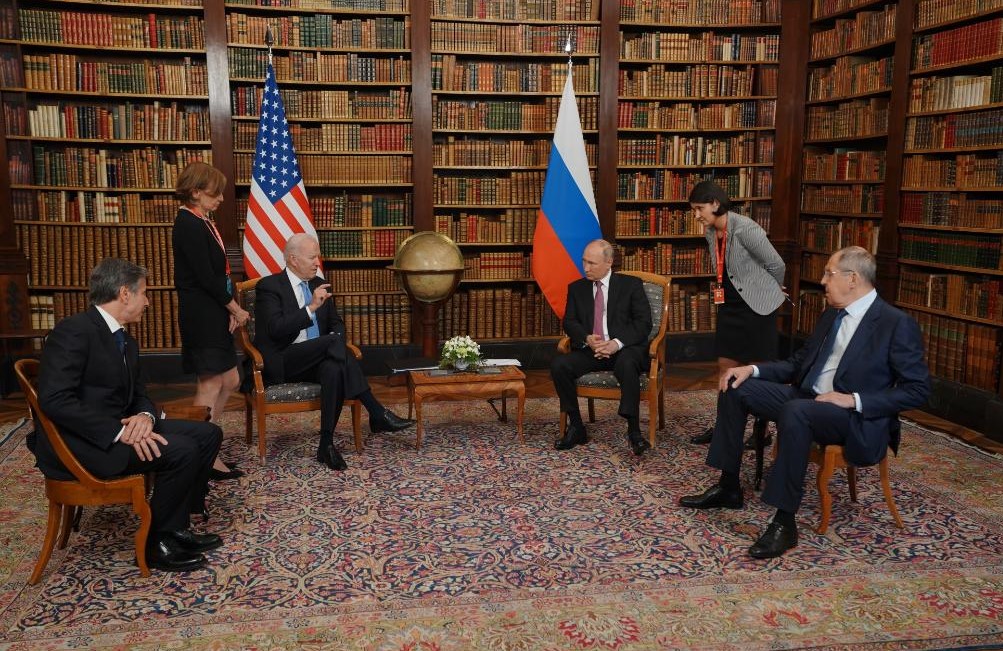 Official White House Photo
Official White House Photo
Putin-Biden Summit: Low Expectations Yield Surprising Results
Presidents Joe Biden and Vladimir Putin met for their highly anticipated first summit in Geneva, Switzerland last week. Although the meeting ran shorter than the expected five hours, both leaders praised the meeting as “positive” with “no hostility.” The meeting was the first face-to-face meeting between the leaders since President Biden took office this year.
Strategic Stability
Despite the rhetoric preceding it, the summit was largely constructive and both sides agreed on the importance of opening and maintaining a dialogue on strategic stability. The White House released a statement explaining the progress made during the discussions.
Both nations have worked cooperatively when it comes to maintaining a strategic stability in nuclear warheads. At the height of the Cold War, Washington and Moscow agreed that nuclear war was something to be avoided. Biden and Putin once again reaffirmed the principle that “a nuclear war cannot be won and must never be fought.” It is welcome news that in the aftermath of the extension of the New START Treaty, Moscow and Washington agreed on the formation of a bilateral Strategic Stability Dialogue to pave the way for future arms control and risk reduction measures. With both countries working on plans to modernize their nuclear arsenals and with the emergence of new technologies, the lack of mechanisms to monitor these systems increases the threat posed by them if they are deployed. This bilateral working group presents an opportunity to ensure that these new developments in military technology are accompanied by agreements and treaties that will regulate them.
Disagreement between Washington and Moscow regarding arms control treaty violations has revolved the ways in which particular weapons systems violated the terms of those treaties, particularly the INF Treaty. Given this, it is interesting that during his press conference, Biden mentioned that he and Putin had briefly discussed such weapons systems, which pose a threat to both sides based on their very short response times. This is another welcome development and presents an opportunity to implement better verification systems, perhaps by including a mandatory review period clause in future treaties for both parties to review the status and implementation of the treaty and offer an opportunity to suggest revisions or modifications as needed.
Cybersecurity
Cybersecurity was predicted to be a hot topic at the summit and unsurprisingly, it dominated the press conferences. Both leaders were in agreement on the importance of the issue, but beyond announcing planned future “consultations,” few details were provided on what these consultations would entail. President Biden did implicitly warn of retaliation should Russian hackers continue to target the U.S., even providing the Russian delegation with a list of critical infrastructure that is off limits. Biden’s reluctance to publicly state specific retaliatory measures may offer a face-saving opportunity for Putin to quietly reduce hacking from within Russia’s borders and avoid a stronger, more explicit response from the United States. In this way, Russia may still opt to continue denying involvement by its citizens or state entities in recent cyberattacks. Considering Russian behavior, not rhetoric, is the relevant indicator about whether Putin has taken Biden’s implicit warnings seriously. The U.S. will need to monitor the frequency and severity of attacks emanating from within Russia’s borders to see if there is a demonstrated reduction in cyber hostility. If there is no reduction in cyber-attacks, then more explicit forms of deterrence may become necessary.
Ambassadors
Putin and Biden’s agreement to return their respective ambassadors to Moscow and Washington was a positive step towards improving relations that are at a post-Cold War low. Following recent consulate closures and a slew of diplomat expulsions, the United States’ ability to communicate its values and stay aware of what’s happening abroad in Russia has significantly diminished. At the summit, both governments signaled a willingness to discuss allowing State Department officials and their counterparts to eventually return to their posts. Ultimately, reopening consulates and resuming open diplomatic dialogue should bring the Biden administration closer to a more predictable and stable relationship with Russia.
Surprising Results, Uncertain Future
Overall, the summit in Geneva was, as expected, uneventful. Nevertheless, the results managed to surpass low expectations. The meeting signaled that between the two countries, a working relationship is still possible and opportunities for cooperation, albeit limited, are still available. However, in light of the Biden administration’s recent announcement regarding a new package of sanctions on Russia for its poisoning of Alexei Navalny, establishing a stable bilateral relationship in the near future remains uncertain.





